Belgium. Part 5
Description
This section is from the book "Belgium - John L. Stoddard's Lectures", by John L. Stoddard. Also available from Amazon: John L. Stoddard's Lectures 13 Volume Set.
Belgium. Part 5
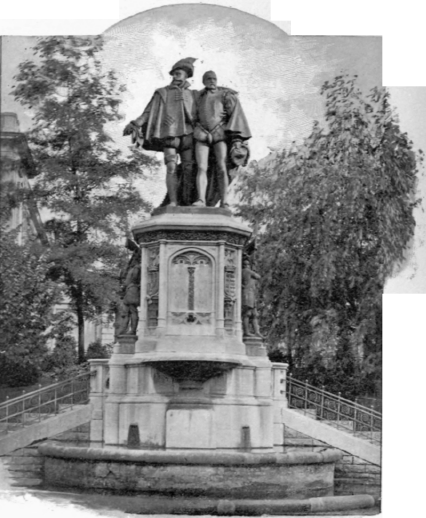
Egmont And Hoorn.
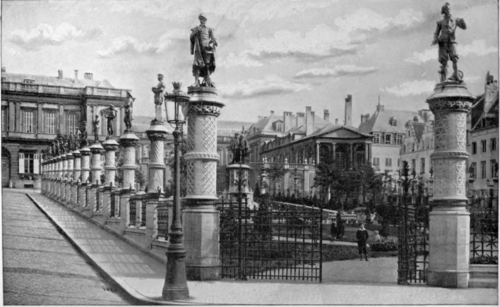
A Brussels Park.
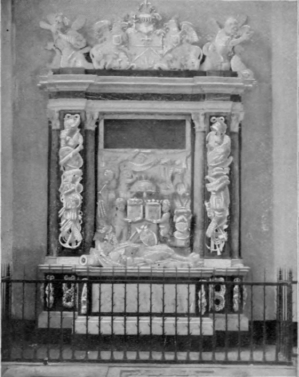
Monument To Admiral Tromp.
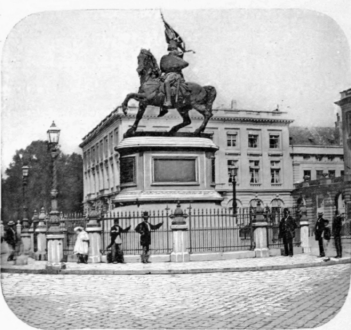
Godfrey De Bouillon.
The monument erected to the memory of Egmont and to that of his loyal friend, Count Hoorn, is a reminder of the fact (too frequently forgotten) that, in the valorous resistance made by the Dutch against the cruel and colossal power of Spain, the Belgians joined with equal ardor and self-sacrifice; and, although not as successful as their neighbors, furnished nevertheless some of the grandest leaders in that mighty struggle, and many of the noblest martyrs to the sacred cause. The Flemish provinces, being easily reached, were quickly overrun by the well-trained troops of Spain, and consequently the Flemish people never had the same opportunities as the Hollanders for achieving victory; but Counts Egmont and Hoorn, together with many other brave compatriots, fully shared with William of Orange and Louis of Nassau the dangers and privations of that terrible war, and their immortal names are held to-day in solemn reverence throughout the realm.
Among the prettiest features of Brussels is the Place Royale, where one looks out from his hotel upon a handsome square, adorned with the equestrian statue of Godfrey de Bouillon, the hero of the first crusade. Brussels, like Paris, is not merely a gay, modern city; it has a background of impressive history. This statue, for example, represents the old crusader in the attitude which he assumed when, on this very spot, in 1097, he raised the standard of the Cross, and urged his fellow-countrymen to follow him to Palestine to rescue from the Saracens the sepulchre of Christ.
What an age of enthusiasm was that when such appeals drew multitudes away from home and kindred, to march thousands of miles, through endless difficulties and with no pecuniary recompense, to fight with desperate courage for an idea! It was the age that built cathedrals and worshiped God in forests made of stone; the age of chivalry, born of a reverence for the Madonna, which made all womanhood appear divine; and, above all, an age of sentiment, like that which caused the hero Godfrey, when elected King of Jerusalem, to refuse to wear a crown of gold in the city where his Saviour had worn a crown of thorns. Those days are gone. Cathedrals and crusaders would now be anachronisms. The ladies for whose glances mailed knights contended in the tournament, or on the tented field, have been succeeded by the "New Woman." The narrow, mediaeval river of intolerance, curbed by the granite walls of dogma (and hence impetuous in its pent-up fury) has reached the open sea whose waves touch distant shores, and whose horizon steadily recedes as we advance. We can no more go back to the old age of simple faith and ardent zeal, than can the stream return from the broad ocean to its mountain channel; and yet, we sigh for something we have lost, and with an irrepressible yearning for a resurrection of enthusiastic faith and feeling, we agree with Holmes that "it is faith in something, and enthusiasm for something, that makes a life worth looking at." One of the finest modern buildings in the Belgian capital is the Bourse, which was completed in 1774 at a cost of a million dollars. It seemed to me, at first, incredible that such an elegant edifice, elaborately adorned with Corinthian columns, allegorical statues, and beautiful reliefs, could be merely the Stock Exchange; yet it is characteristic of the city. Brussels is wealthy. Belgium is progressive. It cannot boast of an extensive territory, but it is determined to make the little that it does possess not only prosperous but beautiful. As an illustration of its enterprise, it is worthy of note that this most densely populated country in Europe was the first on the Continent to establish a system of railways.
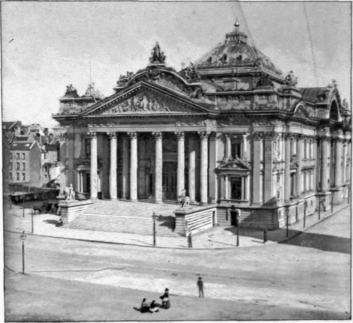
The Bourse.
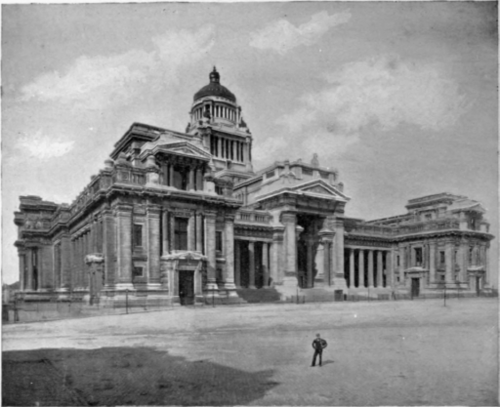
The Front Of The Palace Of Justice.
The tourist in Belgium may well ask himself, therefore, "In the present condition of Europe is not a small, well-governed monarchy like this much better off than larger ones which must maintain enormous standing armies, and are continually fearing war?" The policy of Belgium seems to be: "Let others shake the tree ; I will pick up the fruit."
Continue to:


